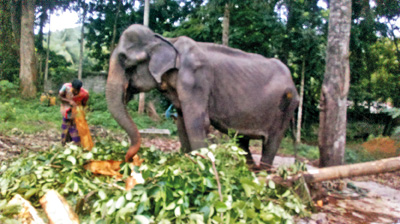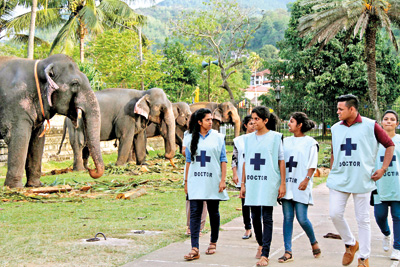News
Spotlight on how elephants are judged fit for peraheras
It has emerged that Tikiri, the emaciated old elephant that was paraded in the Kandy Esala Perahera despite appearing to be ill, might have been used in the procession for two days without approval by the head veterinarian attached to the Temple of the Tooth.

At the centre of a controversy: Tikiri back home at her owner's. Pic by L.B. Senaratne
Worldwide outrage followed media and social media reports prompted by a post by an elephant conservationist that showed photographs of Tikiri in the perahera, her skeletal frame undetected underneath long, colourful robes during the procession, and of the 70-year-old elephant lying on the ground, unable to move.
The Chief Veterinarian for the Temple of the Tooth, Professor Ashoka Dangolla, said Tikiri had been unable to raise its head on Tuesday morning, August 13.
“That was an expected situation in view of the age of the elephant,” said Prof. Dangolla, who is now calling for the government to bring in a mandatory retirement age for elephants used in peraheras and for safari rides.
“As this elephant was not feeding during the night its blood sugar levels had dropped and therefore it was weak in the morning and needed assistance to get up. I was able to treat the elephant and get her back on her feet.”
Tourism and Wildlife Minister John Amaratunga on Thursday called on the Department of Wildlife to investigate how Tikiri had been judged as being fit to be paraded.
“I have ordered officials to initiate an inquiry and ascertain how and why an elephant in such poor health was used in the perahera and to take necessary action against those responsible,” he said.
A social media post by well-known Thai elephant conservationist Lek Chailert on his Save Elephant Foundation Facebook site about the elephant’s plight suggested Tikiri had been paraded for as many as 10 days.
Tikiri’s owner, Isanka Aamal Tillekeratne, insists that Tikiri had only been in the perahera for one day.
Prof. Dangolla told The Sunday Times yesterday that he had only given approval for Tikiri to be paraded on one night of the perahera, Sunday, August 11.
After seeing Tikiri that Sunday, Prof. Dangolla said he had told the elephant mahout (keeper), “Only for one day will I permit her to be paraded in the streets. Afterwards, Tikiri should go back home immediately as she needs rest.”

A group of vets walk passed elephants being fed before parading the streets for the perahera Pic by Indika Handuwala
“As the elephant was privately owned the owner too had his own local doctors. They too gave approval and the final decision on the elephant joining one perahera was taken by the owner,” the Chief Veterinarian said.
Following the concerns raised in the media subsequently, Prof. Dangolla said he had checked with the Devale officials involved in the perahera and had been told the elephant had been in the perahera for two days before he had seen it.
The officials had explained him that the owner had made a sacred vow to march the elephant in the perahera. The Basnayaka Nilame of the Vishnu Devale told this paper that due to the vow temple officials had permitted the elephant to take part in the procession for three days.
Mr. Tillekeratne said he had made a vow to the Sri Maha Vishnu Dewalaya that he would parade his elephant in the Esala Perahera if it recovered from an “ailment”.
“As she was better I wanted to fulfill the vow made to the god,” Mr. Tillekeratne told The Sunday Times.
He said during the past six months Tikiri had been suffering from poor digestion and been unable to obtain nutrition from its food.
The elephant was being treated with traditional medication and ayurvedic doctors had advised that it be walked to help it remain active and capable of digesting food. Mr. Tillekeratne said he strongly believed in local medicine and did not trust Western medication as that would make the elephant weaker.
He insisted Tikiri was strong enough to parade and to even carry a person on her back despite her gaunt appearance.
Prof. Dangolla said yesterday that what ailed Tikiri was old age and complications arising from it.
Prof. Dangolla said that, prior to the perahera, elephants belonging to the temple and four devalayas and the privately-owned elephants brought in to take part in the parade are checked by veterinary surgeons.
Firstly, it must be ascertained that the animal is not coming to musth, when its reproductive hormones surge into activity and it becomes prone to aggressive behaviour. Elephants in musth are not allowed in the perahera.
Then, Prof. Dangolla said, vets check whether an elephant is in discomfort or experiencing any illness that would make it unfit for walk 1.5km. He said it is recommended that elephants walk 32km daily.
Prof. Dangolla said he had been making suggestions for perahera elephant welfare, including a retirement age, for many years but government after government had not acted. He said the government had to step in and regulate elephant management.
He also suggested that social media activists who drew attention to Tikiri’s plight refrain from seeking public attention and instead help to ensure quality of life for these animals.
He said the elephants belonging to the Temple of the sacred tooth at Kandy were in good shape and good health and are only used for the Kandy Perahera.
Mr. Tillekeratne said he had bought Tikiri from a person at Pilimatalawa 10 years ago and admitted that he had been using the elephant to give safari rides until about six months ago when, he said, she had become ill.
The secretary of the Elephant Owners’ Association of Sri Lanka, Damsiri Bandara Karunaratne said elephants normally live about 80 years and that ayurvedic doctors as well as the other doctors had approved parading 70-year-old Tikiri in one perahera “as the elephant was fit enough”.
He said that animal rights activists and NGOs are always ready to attack elephant owners and handlers during the perahera season.
“There are so many animals that are being cruelly handled, slaughtered and even killed for no reason. Why can’t they give attention to that and stop those activities?” he asked.
“We welcome an inquiry by the Ministry of Wildlife to conduct an inquiry regarding the incident. The Department Wildlife and Zoological Gardens should look into welfare of captive elephants, they should not only restrict themselves only working on matters of renewing licences.
They need to take initiatives call meetings with us and regulate and educate elephant caretakers as well as owners” he said.
Minister Amaratunga issued a statement saying he had instructed veterinary surgeons of the Department of Wildlife Conservation to immediately inspect Tikiri’s condition and recommend remedial measures.
Following that, ministry and departmental officials are to initiate an inquiry into the matter to learn how and why elephant in such condition used in perahera and take necessary action against those responsible.
Mr. Amaratunga said he had also instructed his officials to review the work carried out by a committee experts in 2015-2016 on preparing guidelines for owners to ensure the health of captive elephants, He added that a team of veterinary surgeons from the department would check the condition of these elephants.

